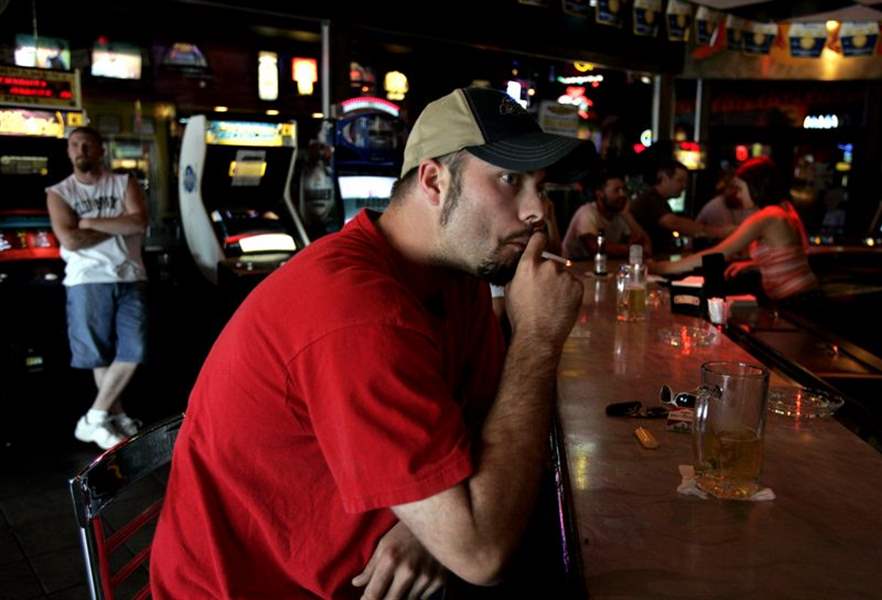
Toledo smoking battle subsides
7/3/2005
Justin Schwochow has a cigarette at the bar of Jed's Barbeque & Brew in South Toledo.
Wadsworth / Blade

Justin Schwochow has a cigarette at the bar of Jed's Barbeque & Brew in South Toledo.
Six months after voter-approved amendments to Toledo's smoking ban went into effect, the city has gone from being on the front lines of the secondhand smoke battle to a place where smokers light up in public with relative ease.
"It's not as big a deal as it used to be," said Ryan Kemp, 28, as he smoked a Marlboro Light and sipped a beer at Jed's Barbeque & Brew in South Toledo.
Dr. David Grossman, commissioner for the Toledo-Lucas County Health Department, isn't surprised Mr. Kemp feels that way.
"My feeling, and it's purely anecdotal, is it's anything goes," Dr. Grossman said.
Whether it's because of widespread compliance with the new ban or lax enforcement, city data suggest the issue has died down.
In the first six months of 2004, when the ban was a hot topic, 401 complaints were filed by citizens against violators of the ban, which was then tougher and included bars. There also were 137 warning letters issued by city inspectors, and 169 citations or notices of violation sent.
In the first six months of this year, through Wednesday, 17 complaints were filed, 14 warning letters were sent by city officials, and no citations were issued.
Smokers like Mr. Kemp are just fine with that, saying the original ban was too tough in the first place. Anti-smoking advocates like Dr. Grossman are frustrated that Toledo, after being the first community in Ohio to pursue a tough smoking ban, appears to have fallen behind in the no-smoking battle.
Ken Pompora, the owner of Jed's, falls somewhere in the middle. He thinks the new ban is a good compromise but wishes the city was doing a better job ensuring everyone follows the rules. "It's unfair to me, a guy who spent all this money," he said of the improvements he made to his two Jed's restaurants.

Ken Pompora, owner of Jed's Barbeque & Brew, says the new ban is a good compromise, but he wishes the city was doing a better job of everyone follows the rules.
City officials point out enforcement, like with the old ban, is complaint-based, so if no one complains, there's little for them to do.
Though no one is complaining in Mr. Pompora's two Jed's restaurants, that happiness has come at a price, he said, standing under part of his $250,000 investment to comply with the ban: a high-powered ventilation fan. "This will probably suck your toupee off if you walk under it," he said, pointing at the fan.
The original ban outlawed smoking in bars and restaurants while allowing for smoking lounges. The amended measure went into effect Jan. 1 and exempts most bars while expanding the size of allowable smoking lounges.
Mr. Pompora said he's not asking for the return of the "smoking police," but it might not hurt for the city to visit area businesses to make sure they're complying and offer education and guidance while doing so.
Mary Chris Skeldon, spokesman for Toledo Mayor Jack Ford, said Mr. Ford opposed the amendments but still thinks the new ban is working well. She said the drop in enforcement activity is probably a result of more compliance.
"I think people in general, or establishments in general, are in compliance and citizens are pleased with the changes, therefore there are fewer complaints," she said. "[But] we will pursue any complaints, so we encourage citizens to call" if they have any.
Jeanette Ball, acting manager of the city's Environmental Services Department, said the city rarely sends out inspectors for random inspections - nine have been done so far this year - and prefers to rely on citizen complaints before investigating.
"We're responding to complaints as we receive them, and we're pretty confident it has made an impact," she said.
Under the new amendments, which voters approved 51.4 percent to 48.6 percent in November, 2004, there are fewer locations where there could be violations. The previous ban, passed unanimously by City Council in 2003, banned smoking inside all public places, including bars and restaurants. It allowed enclosed smoking lounges to take up to 30 percent of an establishment if it had separate ventilation.
The amendments made several changes to that. Bars are exempt if they derive less than 35 percent of their gross revenue from food sales. Bowling alleys and bingo parlors also are exempt. Restrictions on restaurants were relaxed - those with nine or fewer employees can ask for an exemption to the ban, and a smoking lounge with a separate ventilation system can take up to 50 percent of the establishment.
Another issue for some critics of the amended ban is how vigilant the city's bars and restaurants have been in seeking approved exemptions or getting permission for a smoking lounge.
Though the new ban creates exemptions, a bar or restaurant still must apply and have its paperwork approved before an exemption is granted and smoking is allowed inside a public place, Ms. Ball said.
As of last month, 96 establishments, mostly bars or small restaurants, had been granted complete exemptions to the smoking ban by city officials. In addition, 76 bars, restaurants, or bowling alleys had approved smoking lounges.
That means less than 20 percent of Toledo's 1,107 bars and restaurants have received approved exemptions or smoking lounges.
Some of those who haven't applied for exemptions already banned smoking; many fast-food restaurants, for example, have long banned smoking.
While residents like Mr. Kemp appreciate the changes, others are dismayed.
"I'm a person who avoids places with smoke. I was pleased last year that I could go to nightclubs again, but once they relaxed the ban, the money now stays in my pocket and I don't go," said Jerry Cousins of Toledo, who was finishing a meal recently on the patio area outside of Gumbo's in East Toledo.
"If they had left it how it was, people would have adjusted," chimed in his lunch companion, Olivia Hunter of Toledo.
Neither is impressed with the smoking lounges they've encountered at area restaurants, either. "I can still smell it," Mr. Cousins said. "And if you can smell it, you're breathing it."
Dr. Grossman said while more exceptions are allowed, he thinks part of the reason it appears city officials are paying less attention to the ban is uncertainty about the requirements.
He pointed out that he's noticed several smoking areas that have no doors sealing them off from the rest of the restaurant. Ms. Ball said the city's interpretation of the amended rules is the lounges don't need to have doors as long as there's "negative pressure" created by a separate ventilation system to prevent smoke from leaving the area.
That's news to Mr. Pompora, who said he was warned in May by a city inspector for not having a door closed on his smoking lounge at his Jed's in North Toledo. At the time, he said his air conditioning was being repaired, requiring the door to be open.
"[The city] should do a general inspection on a regular basis," he said. "Not to harass people, but to help them abide by [the new ban]."
But it's not just business owners confused by the new rules, said Mike Mancy, president of the Northwest Ohio Restaurant Association and co-owner of Mancy's Steaks, Mancy's Italian, and Shorty's Bar-B-Que.
"I think a lot of people don't understand it. I have people all the time who, when we ask them 'Smoking or non?' say, 'How can you have smoking?' " he said.
Mr. Mancy, who spent $7,000 for an enclosed smoking area at Mancy's Steaks in West Toledo, said all the attention about a smoking ban in the last few years has shifted public opinion.
"It's definitely changed the mind-set of nonsmokers. They're much less tolerant," he said. "Just last Friday, we had a 45-minute wait in nonsmoking and no wait in the smoking lounge. Everyone said they'd wait."
Jim Avolt, owner of The Distillery bar on Heatherdowns Boulevard, opposed the original smoking law and was one of the organizers of the effort to amend the ban. He has been granted a city-approved exemption to the ban.
"People need to comply with it one way or another," he said. "It's now a fair law instead of just catering to nonsmokers. It's a law everyone can live with."
He's living with the new law, but Dr. Grossman isn't happy about it.
When he goes to a restaurant or bar today, he said he's struck by the irony of what's happened in Toledo.
Nearly five years ago, he proposed that the health department ban smoking inside all public places in Lucas County. The board eventually did, but the ban was put on hold after bar and restaurant owners sued.
The ban was thrown out by the Ohio Supreme Court in 2002 after the court ruled the board overstepped its legal authority. In July, 2003, Toledo City Council unanimously passed a ban on smoking inside all bars, restaurants, and other public places, though it allowed separate smoking lounges of up to 30 percent of the establishment's service area.
Bar owners failed to get the courts to overturn the ban, so they collected enough signatures to get the issue before voters, and a majority of voters agreed with their positions and passed amendments to the ban.
Since Dr. Grossman first proposed limiting smoking in Lucas County, other Ohio cities picked up on the idea.
Bowling Green voters passed a ban in 2001 and Wauseon voters passed one in 2004.
Both have some exceptions. Columbus voters in 2004 passed a ban on smoking inside all bars and restaurants without exemptions.
"It's an embarrassment for me, that this community had a chance to be first, but now we're going to be last. Now we're the laughingstock," Dr. Grossman said of the weaker ban.
Whether Toledo has fallen behind might become moot. Emboldened by successes in places like Columbus and frustrated with what they see as a weakened law here, anti-smoking advocates are now collecting signatures to get a statewide smoking ban before Ohio voters next year.
The group needs 96,870 signatures to get the matter before the Ohio General Assembly in January and had more than 28,000 collected as of Friday. If the legislature fails to act, or tries to amend the ban, the group again would need to collect 96,870 signatures to bypass the lawmakers and get the issue on the November, 2006, ballot.
Statewide bans elsewhere have begun to gain momentum. The National Conference of State Legislatures says 18 states have passed, or are considering, smoking bans inside public places.
Many carve out exemptions, though others are complete bans.
Stu Kerr, a local organizer for Tobacco-Free Ohio who was active in the smoking-ban debate in Toledo, said Ohio's law would be modeled after the Columbus measure, meaning no exceptions or smoking lounges would be permitted in bars or restaurants.
He said his group is going for a ballot issue because he and his supporters don't trust the Ohio legislature to pass a good law without exemptions.
"It goes back to if it's bad for you in one place, it's bad for you in every place. It's a worker protection issue," he said.
Mr. Mancy said he has no doubt a state ban is on the way and worries it would hurt business. That's why he said it's likely restaurant owners, who largely sat out the Toledo debate and let bar owners fight the ban, would battle hard against a state ban.
"Let's get on the bus instead of getting run over by it," he said, adding he'd push for something like what Toledo has now; allowing for smoking lounges in restaurants and exempting bars.
Contact Luke Shockman at: lshockman@theblade.com or 419-724-6084.